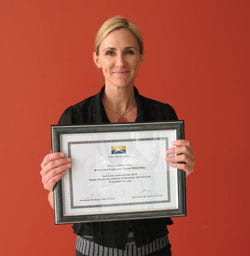A Curtin professor has been acknowledged for her industry-leading research at the exclusive National Health and Medical research annual awards in Canberra.
Professor Tanya Chikritzhs’ work leading the alcohol policy research team at the Curtin-based National Drug Research Institute saw her take out an Achievement Award – the only Western Australian to be recognised on the night.
“There are lots of ups and downs in this kind of research, and as many of my colleagues will attest population health research often goes without the acclaim that it deserves,” Professor Chikritzhs said.
“So it’s terrifically motivating to receive this level of recognition, and I’ll continue to work towards outcomes that have a real impact on the health and wellbeing of Australians.”
Professor Chikritzhs’ research examines many of the wide-ranging effects of alcohol on communities, and how policies may be put in place to minimise its negative influence.
“We’ll look at, for instance, the impact that changes of trading hours for licensed premises have on levels of violence at home or at the pub,” she said.
“But we’re also looking at the relationship between alcohol and heart disease, or prostate cancer. So we address alcohol in a broad way. We work towards taking an approach that makes sure the outcomes are readily translatable and transferrable into policy.
“And I guess that’s what some of this recognition is about; rewarding work that has an impact in the real world.”
Professor Chikritzhs said she was drawn to drug and alcohol research by the range of issues thrown up by alcohol use, and the opportunity to make practical changes in order to rectify them.
“80 per cent of people drink (in Australia), so it’s not a rare thing; its repercussions are widespread, be they diseases or injuries. There are so many different angles to come at it from.
“And I tend to be a practical person, so it’s important for me that our work has real practical relevance to decision-makers and policy-makers.”
[youtube]http://www.youtube.com/watch?v=bKzW7Bsjzzw[/youtube]



